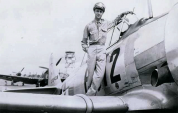5:34 | At first they were confident a relief convoy would appear around the corner at any moment. That convoy never came. As MacArthur left for Australia and Bataan was written off by the men at the top, Bert Schwarz and the rest of the Battling Bastards of Bataan faced an overwhelming enemy force and were captured. Rocky Gause was one man who wasn't going to take it.

Inspired by Lindbergh, Bert Schwarz became an Army Air Corps pilot and was assigned to the Philippines. Arriving ahead of their planes, the flyers and their crews became provisional infantry when war with Japan broke out. As American forces consolidated in Bataan and formed lines, there was no hint of what was to come. A tough Georgia boy named Rocky Gause kept spirits up.
They were prepared to hold their own in Bataan, but Air Corps pilot Bert Schwarz was one of many who felt their commander, a retired WWI balloon pilot, was not up to the challenge. Helped by Ed Dyess and Joe McMicking, he flew to Corregidor to pass his concerns on to Reggie Vance, his friend at headquarters. By the time he got back, the man had been replaced.
Whatever you have heard about the Bataan Death March, you can believe, says Bert Schwarz. His determination kept him going while many died from deprivation or a bayonet. After the unbelievable ordeal, they got to Camp O'Donnell, which was even worse. Men continued to die and burial details were a constant duty.
Bert Schwarz tells the story of the cross built by POW's when a Japanese guard gave them a sack of cement for a shrine to their dead comrades. The most able bodied were sent to Davao Penal Colony which had farms and orchards. This was where Schwarz became an expert at rice farming.
Their meager rice ration was cut in half after nine men escaped. The American prisoners had survived the Bataan death march and were now laborers in Davao. A group was sent to build an airfield, but when a B-24 came and bombed it, they never worked again. They never ate again either, says Bert Schwarz.
The POW's had no food or water and now, in the hold of a cement freighter, they couldn't breathe either. In transit to yet more labor for the Japanese, liberation for Bert Schwarz came in the form of an American torpedo. With friends Gene Dale and Johnny Playter, he swam to shore where guerrilla leader Joaquin Macias welcomed them to freedom.
Returning to America after years as a POW in the Philippines, Bert Schwarz returned to the textile industry, then took a government position in Japan, where he was wooed to work for the most prestigious Japanese textile firm. He underwent a very substantial change in attitude about his former enemies.